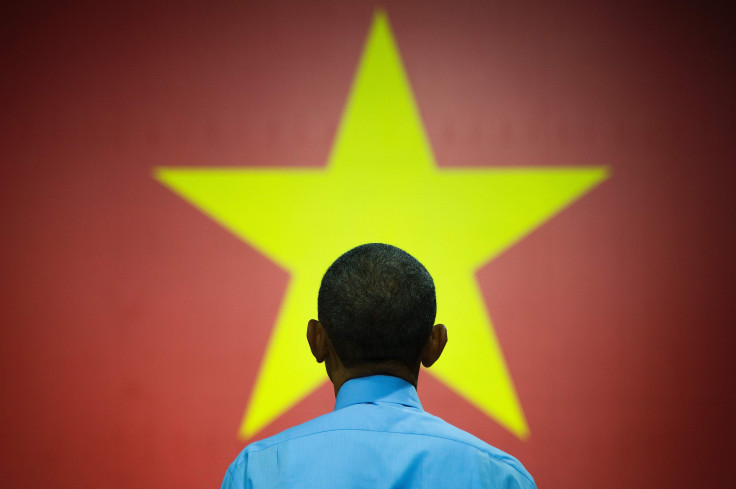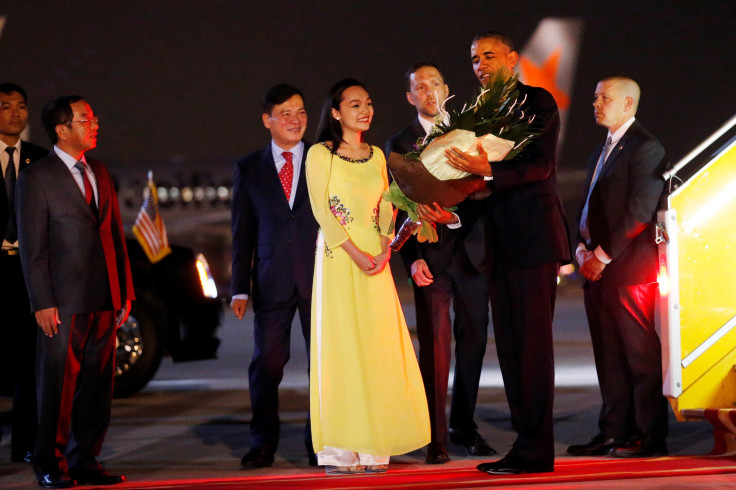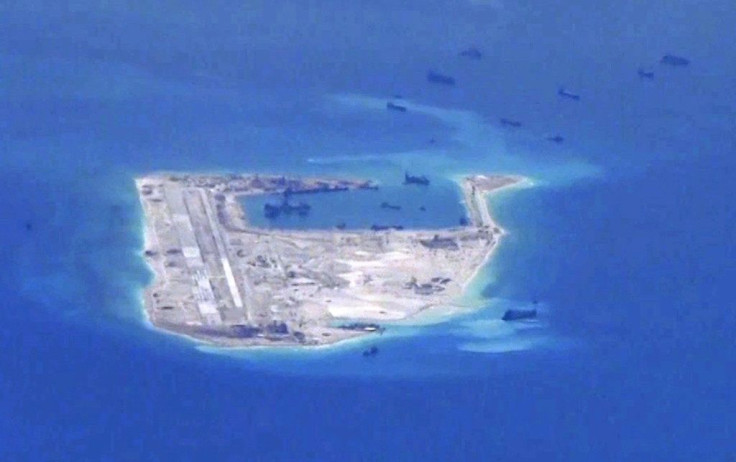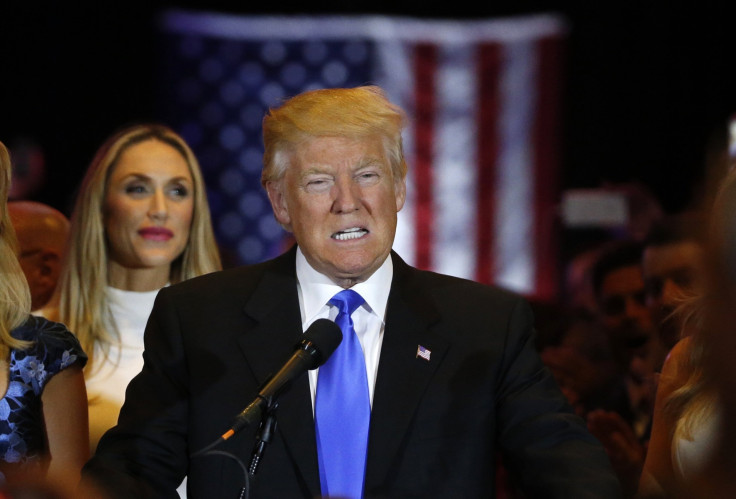China Tension, Trade And Trump Hang Over President Obama’s Asian Farewell Tour Aimed At Shoring Up His Political Legacy

SHANGHAI — President Obama’s Asia tour, which has included a historic lifting of the U.S. arms embargo on Vietnam, and will include a speech at Hiroshima, the Japanese city destroyed by an American nuclear bomb, is aimed at shoring up his legacy of rebalancing U.S. foreign relations in the Asia Pacific region. But analysts say tensions between the U.S. and China over the latter’s reclamation of land in disputed waters in the South China Sea have been heightened by the deal with Vietnam — and there's a risk of confrontation between the two countries in the region.
Some observers suggest the durability of what has been called the “pivot to Asia” may depend to a large extent on whether the Trans-Pacific Partnership trade accord (TPP) — the landmark agreement among 12 nations, brokered by Obama — can be passed. It currently faces opposition in Congress and from presidential contenders Donald Trump and Hillary Clinton (though Clinton originally supported the treaty, and some believe she could change her position on it if elected). Trump has also promoted a far less proactive foreign policy, and has threatened to take a tough line on trade disputes with China, adding to the uncertainties that have overshadowed the president's Asian tour.
“Obama has to sell U.S. commitment to Asia, so that Asians feel the U.S. is committed to helping them deal with China, and to passing the TPP,” Professor David Zweig, director of the Center on China's Transnational Relations at the Hong Kong University of Science and Technology (HKUST), told International Business Times. “But he’s also got to sell TPP and Asia in the U.S. – and that could be a tough sell. He’s got to show that new jobs are being created; otherwise he’s not going to have his legacy. TPP will die, and his rebalancing will die, because he could lose support for America in Asia."
The Obama administration would point to the accord with Vietnam, and the recent peaceful transition to democracy in Myanmar as evidence of its achievements in the region – and Zweig acknowledges that U.S. policies “have had an impact” in the latter case. But faultlines have recently opened up over U.S. demands for Myanmar, and the new leadership under Aung San Suu Kyi’s NLD party, to give full citizenship rights to ethnic Muslim Rohingyas, many of whom are effectively stateless and remain generally unwelcome in Myanmar.

“U.S. relations with Myanmar won’t be so cozy now,” Kavi Chongkittavorn, a senior fellow of the Insitute of Security and International Studies at Chulalongkorn University in Bangkok, told IBT. He said Obama was initially very successful in reaching out to members of the Association of Southeast Asian Nations [ASEAN] but said the U.S. administration had been “naïve” in pushing its human rights line over the Rohingya, and also in criticizing Thailand, a constitutional monarchy, for its strict implementation of laws on lèse majesté, the crime of offending the dignity of a sovereign or state. Some in Thailand feel that the U.S. “seems to be being more friendly to Vietnam [which it has often criticized over human rights issues] than to its traditional Thai allies," he added. "They’re letting Vietnam join the TPP, which calls for the highest standards of economic openness — and Vietnam is not even a [full] market economy.”
But China is where there’s been the most concern about the U.S.'s closer relationship with Vietnam, particularly the lifting of the arms embargo — a deal that will allow U.S. warships to use the naval base at Cam Ranh Bay for the first time since the end of the Vietnam War in 1975. Chinese newspapers have rejected Obama’s assertion that the move isn't targeted at China: The official Global Times said in a commentary that Washington was “taking advantage of Vietnam to stir up more trouble in the South China Sea,” part of which Hanoi also claims.
The Global Times said the decision would exacerbate “strategic antagonism between Washington and Beijing,” while the official China Daily added that further interference in the South China Sea risked “turning the region into a tinderbox of conflicts.”
Tension has risen over the past 18 months, as Beijing has begun reclaiming land – and in some cases building runways – on several islets and reefs in the disputed Spratly Islands chain, which is also claimed in whole or part by Vietnam, the Philippines and several other countries. In response, the U.S. has launched a series of “freedom of navigation operations” through waters and airspace claimed by China, in an attempt to prove that these lie in international waters — provoking an angry reaction from Beijing.
President Obama said in Hanoi this week that such operations would continue. In the most recent case, earlier this month, the U.S. said two Chinese fighters had flown dangerously close to an American reconnaissance aircraft overflying the region. China responded by accusing Washington of dangerous brinksmanship that increased the risk of confrontation. And China’s foreign minister Wang Yi reiterated Beijing’s view that “Countries outside the region have no right to infringe” on China’s sovereignty in the South China Sea, according to the Global Times. Beijing has also said leaders of the G7 group of rich nations — including President Obama — should not repeat their recent statement on the issue when they meet in Japan this weekend.

Some critics are asking whether these tensions could derail Sino-U.S. relations, but others say the issue is likely to be managed within the framework of enhanced bilateral cooperation in other areas. It may not go away:
“Obama is obsessed with rebalancing the Asia Pacific. He wants this as a check or a balance for China’s rise,” Professor Tao Wenzhao, of the Institute of American Studies at the Chinese Academy of Social Sciences, told IBT. “And he’s chosen the South China Sea as the outstanding issue, because of its important central strategic position in the region. People are really angry about this. But,” he added, “we also understand that Obama doesn’t want war … Overall the relationship is still positive – there’s a lot of cooperation on issues including climate change, the Iranian and Korean nuclear questions, finance.”
And Tao noted that when the USS Lassen sailed close to a Chinese-controlled reef in the South China Sea last October, it “did not carry out any military maneuvers. Both sides still want to avoid confrontation. We must solve [the crisis] in a peaceful way.”
At the same time, he suggested that the U.S. is pushing to internationalize the [South China Sea] issue and to militarize it. "They want to show their presence – and they don’t recognize Chinese sovereignty in the area. So I think this will be a long-term issue.”
At talks in Washington last year, President Obama and his Chinese counterpart, Xi Jinping. were reported to have agreed not to militarize the disputed islands. But Chinese experts have since warned that continuing U.S. naval and air operations in the area are likely to provoke more militarization of the region by Beijing – though they say this will be purely for defensive purposes.
The biggest risk in the short term could be an accidental clash caused by overzealous flying, as in the recent surveillance plane incident, said HKUST’s Zweig. “Both sides are mainly just maneuvering, China has just followed U.S. ships, and generally kept a distance … The real danger could come from a mistake.”

In a sign that conflict should be avoidable, Zweig notes that in the event of a clash between Manila and Beijing, there is no guarantee that the U.S. would come to the aid of the Philippines — which has been very critical of China over the South China Sea — in contrast to its commitment to defend Japan if it were ever attacked.
The official U.S. line is that it does not reject China’s claims to sovereignty in the region but simply calls on Beijing to resolve disputes with other countries “peacefully … in the rules-based order [and] not unilaterally move to reclamation activities and the militarization of islands and areas that are part of the claims being contested today,” as Secretary of State John Kerry put it this week in Hanoi.
Yet while he agreed there was no question that Beijing’s expansion in the South China Sea had provoked tension in the region, Zweig noted that China was not the only country to have reclaimed land in the disputed waters, and said the U.S. could also do more to defuse tension by addressing China’s concerns.
“The U.S. should also push Vietnam and the Philippines, for example, over their own claims in the South China Sea,” he said. “Part of the reason that China’s being more assertive is because Vietnam and the Philippines have been more assertive [over reclamation] too, but there’s no blame attributed to them. So China's attitude has not come out of nowhere. And by reinforcing the belief of Vietnam and the Philippines' belief that their actions are correct, Obama feeds Beijing’s paranoia. I think the Americans could make the Chinese feel a little more comfortable," he said. "If I were the administration, I might be trying to push for joint development of the region, and encourage the setting aside of history.”
Some observers say it should be possible to rein in current tensions:
“I don’t think it’s likely that the U.S. would go beyond its Freedom of Navigation Operations. U.S. relations with China are much bigger than the South China Sea,” said Kavi, of Bangkok’s Chulalongkorn University. “And,” he added, “ASEAN doesn’t want Washington to hijack the South China Sea issue. Even Vietnam has been very smart – it’s continued to emphasize its relationship with Beijing, and made it clear that it will not shout at China.”
And other experts said simple realpolitik would prevent serious clashes.
“U.S.- Chinese competition in the South China Sea won’t turn into conflict — China knows its strength is still not up to the U.S. level,” Professor Lee Jung-Nam, a China specialist in the Asiatic Research Institute at Korea University in Seoul, told IBT.

How such calculations would be affected if Donald Trump were to win the U.S. presidential election remains to be seen. Some Chinese media and experts have speculated that, despite his criticisms of Beiijng over trade, a Trump victory could lead to an isolationist foreign policy, which might benefit Beijing.
“Trump may think the South China Sea is not a core national interest of the U.S. He’s more focused on domestic issues,” said Tao, of the Chinese Academy of Social Sciences.
And he added: “We’re not really very worried about Trump: He’s a smart businessman. He may want to bargain with China on commercial interests, but we’re not afraid of that – and there’s so much economic interdependence between our two countries. All the U.S. treasury debt China holds, Chinese investment in the U.S. So we guess he’ll be pragmatic.
Korea University’s Lee added that Beijing “traditionally likes Republican presidents – it sees the Democrats as doing more to contain China,” though she said it was quite possible that Trump’s apparently isolationist approach to foreign policy would likely “have to change” if he were elected.
Others were less sanguine.
“A Trump presidency would mean uncertainty and surprise, at a time when we can least afford it,” said Kavi of Bangkok’s Chulalongkorn University, while Zweig predicted trade friction if Trump were elected.
There's no question that President Obama will leave office with continuing uncertainty over the future of his Asian initiatives – and some in the region see China as unlikely to back down on the South China Sea in the future. Beijing says it seeks joint, peaceful development of the region with its neighbors, but Zweig notes that China’s statements on the issue always begin with the statement “Sovereignty is ours.”
And Willy Lam, a specialist on Chinese elite politics at the Chinese University of Hong Kong, told IBT recently that Chinese President Xi Jinping had pushed the South China Sea issue into the public eye because “he wants to be seen as bold enough to stand up to the Americans.” But he said this high-profile assertive approach ran the risk of leaving the president no room to back down if tension continued to grow with the U.S. or other Asian countries. “There is no way Xi can pull back now,” he said, explaining that this would leave the Chinese leader vulnerable to criticism from within the Communist Party and military. “The worst thing for him is to have to shoulder the blame for 'losing face to the world' on a major foreign policy issue,” Lam said.
© Copyright IBTimes 2025. All rights reserved.






















